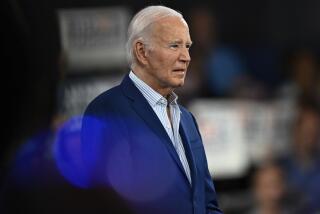A Triumph of Human Spirit, in Which She Put Her Trust
- Share via
I remembered that look--almost beatific, a slight nervous narrowing of the eyes the only sign of an underlying apprehension. I’d seen it at the entrance to the Pentagon, at Grant Park during the Democratic National Convention, at the Kent State campus, at all the patriotic protests of the 1960s. It shone from the face of a girl, her beige dress slightly iridescent in the Philippine sunlight; from the countenance of a burly, sweat-stained worker and an elderly white-bearded man as they waited, a human barrier, listening for the feared rumble of approaching tanks, which never came, partly, at least, because they were there.
It was not the angry face of insurrection, the rage ready to be sparked into violence, but the benign hopeful countenance of patriotic devotion--not to a government, but to a country and a democratic belief that, to the long-suppressed, innermost convictions of the heart, defined the nation, was the nation, as it was meant to be.
To an American, ensnared in the ambiguities of a democracy distorted by realities of world power, admiration had to be mixed with envy for the opportunity to dare everything in a cause whose moral boundaries were so cleanly drawn, in a struggle so certain to be unambiguously decided. And we shared, vicariously and at a distance shrunken by satellite communications, the Filipino people’s joy at liberation, freedom achieved in so extraordinary a manner, so alien from the battles of our blood-drenched century. The hopeful imagination could foresee the gleaming girl grown old, telling her grandchildren that “I was there, in the Manila streets, my body reinforcing the iron gates, the day we won our freedom.”
We watched, listening to the incredibly cheerful conversation of ordinary citizens like ourselves awaiting the uncertain, possibly the violent convulsions of a dying tyrant, their natural terror subdued by the hunger for freedom, which, in part, had been inherited from us, but which they had made their own.
It was that rarity, a morality drama with a happy ending, a crack in time illuminating the almost forgotten power of deeply rooted belief, or, more optimistically, perhaps foolishly so, some possibility of man’s still uncurtained future.
Like the most compelling of dramas, the confrontation in the Philippines yielded not only the inspiration of events but also a hero to focus our admiration: that slight, valiant lady summoned into public existence by a pistol shot at a Manila airport, who, armed only with a courageous, quixotic will, quietly, tirelessly, seemingly indifferent to the mortal danger that accompanied her every day, led her country into freedom.
Before the moment is drowned in the inevitable uncertainties and cynicisms of our graying bureaucratic age, there is this bright clarity: Corazon Aquino has joined that tiny band of unrepresentative people--Mahatma Gandhi, Martin Luther King--who entrusted their cause and life itself to their belief in the decisive power of the human spirit. And who, through the unyielding firmness of their belief that we were better than we thought, made us, for a moment, better than we were.
Throughout events in the Philippines, the United States acted much as it should: We went with the flow, neither trying to halt the Aquino movement nor make it our own. The outcome is an illuminating rebuke to those who assume that every overturn in every continent must be authored in Moscow or in Washington.
Nor should we deny ourselves some feeling of ancestral pride. The Philippines was our only true colony. Surely the democratic values that fortified the Filipinos’ resistance to tyranny, while wholly their own, are in some small measure our legacy.
Whatever we may have taught, the Filipinos have now compensated with a powerful lesson for modern America. The authors of the American Revolution, like the architects of Soviet communism, believed that their principles would spread to other nations. Our Founders, unlike the communists, did not believe that their values should be imposed on others by force, conspiracy or subversion.
Lacking their faith, beset by a powerful enemy, in recent decades we have used open or covert force to alter the course of other countries. With insignificant exceptions, these attempts have failed dismally. Yet, despite our abuses of power, there has been a strengthening and resurgence of democracy in the Asian subcontinent and much of Latin America .
These movements, and the failures of totalitarianism, are tributes to the power of freedom--its hold on the human spirit, its consistency with the deepest hungers of the individual. Adams and Jefferson, Madison and Washington believed that the rights they had secured would appeal irresistibly to downtrodden mankind, that our example, not our arms, would lead to the triumph of democracy. They knew that freedom, by its very nature, could not be imposed. Only dictatorship and repression can be imposed. If we are as strong in our beliefs as they were, demanding only that none interfere with the right of people to choose, by ballot or revolution, their own form of government, then we will be safer in our own freedom and advance the global progress of democracy.
For reminding us of that truth, so deeply rooted in our own history, we must extend the most profound gratitude to the Philippine people and their most heroic leader.
More to Read
Get the L.A. Times Politics newsletter
Deeply reported insights into legislation, politics and policy from Sacramento, Washington and beyond. In your inbox twice per week.
You may occasionally receive promotional content from the Los Angeles Times.










